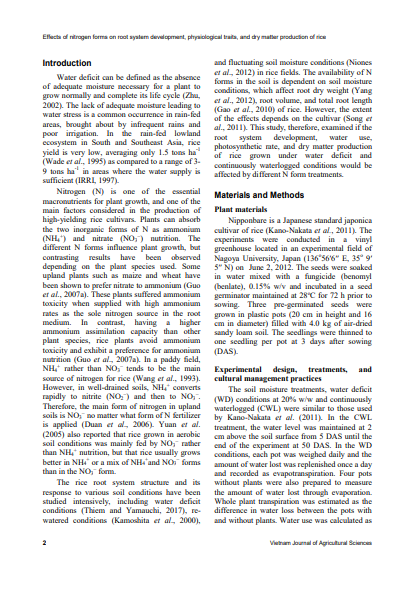Green Solvent Extraction and Quality Characteristics of Passion Fruit Seed Oil (Passiflora edulis Sims var. edulis)
1Faculty of Food Science and Technology, Vietnam National University of Agriculture, Hanoi 131000, Vietnam
Main Article Content
Abstract
The extraction of oil from passion fruit seeds with acetone, ethanol, ethyl acetate, isopropanol, and hexane was studied. The effects of the variables, namely type of solvent, material to solvent ratio, temperature, and extraction time, were investigated. The highest extraction yield was 78.52%, which was obtained using ethyl acetate with a material to solvent ratio of 1/10 at room temperature (28oC) for 4h using a shaker. This yield was similar to that obtained when using hexane as a solvent. Our results indicate that ethyl acetate can replace the conventional hexane solvent in the extraction of oil from passion fruit seeds. The high content of polyunsaturated fatty acids in passion fruit seed oil suggests that this product has good potential for use in the human food, cosmetic, and pharmaceutical industries.
Article Details
References
-
Al-Farsi M. A. & Chang Y. L. (2007). Optimization of phenolics and dietary fibre extraction from date seeds. Food Chemistry. 108(3): 977-985.
Cacace J. E. & Mazza G. (2003). Mass transfer process during extraction of phenolic compounds from milled berries. Journal of Food Engineering. 59: 379-389.
Codex Alimentarius. Fats, oils and related products (revised 2001). Second edition. 8.
Cowan M. M. (1999). Plant products as antimicrobial agents. Clinical Microbiology Reviews. 12(4): 564-582.
Directive 2009/32/EC (2009). The European Parliament and the Council of the European Union. on extraction solvents used in the production of foodstuffs and food ingredients. Official Journal of the European Union. 141: 3-11.
Hammad K. H. A., Zhmurko V. V. & Avksentyeva O. A. (2012). Seed Protein and Oil Content of the Soybean Cultivars under Different Climate Condition (Glycine max (L.) Merr.). American-Eurasian Journal of Agricultural and Enviromental Science. 12(5): 603-607.
Herodež Š. S., Hadolin M., Škerget M. & Knez Ž. (2003). Solvent extraction study of antioxidants from Melissa officinalis L. leaves. Food Chemistry. 80: 275-282.
Malacrida C. R. & Jorge N. (2012). Yellow passion fruit seed oil (Passiflora edulis f. flavicarpa): physical and chemical characteristics. Brazilian Archives of Biology and Technology. 55(1): 127-134.
Nyanzi S. A., Carstensen B. & Schwack W. A. (2005). A Comparative Study of Fatty Acid Profiles of Passiflora Seed Oils from Uganda. Journal of American Oil Chemists’ Society. 82(1): 41-44.
Oliveira R. C., Barros S. T. D. & Gimenes M. L. (2013). The extraction of passion fruit oil with green solvents. Journal of Food Engineering 117: 458-463.
Oliveira R. C., Guedes T. A., Gimenes M. L. & Barros S. T. D. (2014). Effect of process variables on the oil extraction from passion fruit seeds by conventional and non-conventional techniques, Acta Scientiarum Technol. 36: 87-91.
Rabasco A. A. M. & González R. M. L. (2000). Lipids in pharmaceutical and cosmetic preparations. Grasas Aceites. 51: 74-96.
Rehm S. & Espig G. (1984). The Cultivated Plants of the Tropics and Subtropics, Eugen Ulhmer Publishers, Stuttgart, Germany. 185-186 (in German).
Silva R. M., Placido G. R., Silva M. A. P., Castro C. F. S., Lima M. S. & Caliari M. (2015). Chemical characterization of passion fruit (Passiflora edulis f. flavicarpa) seeds, African Journal of Biotechnology. 14: 1230-1233.
Sullivan F. E. (1980). Sunflower oil processing from crude to salad oil, Journal of the American Oil Chemists' Society. 57: 845-847.
Zambiazi R. C., Przybylski R., Zambiazi M. W. & Mendonça C. B. (2007). Fatty acid composition of vegetable oils and fats. Boletim Centro de Pesquisa de Processamento de Alimentos. 25: 111-120.

